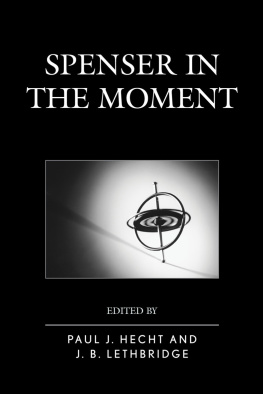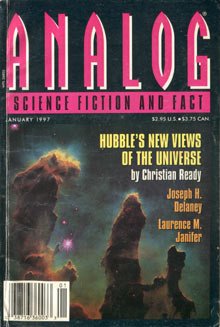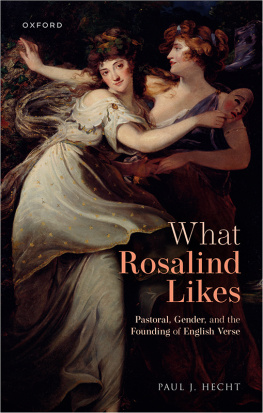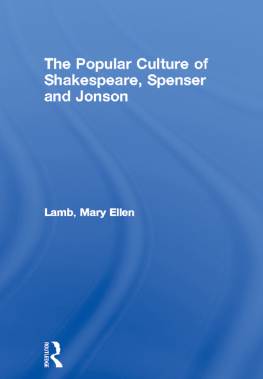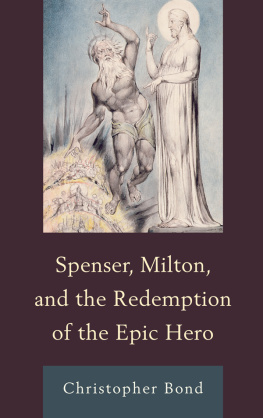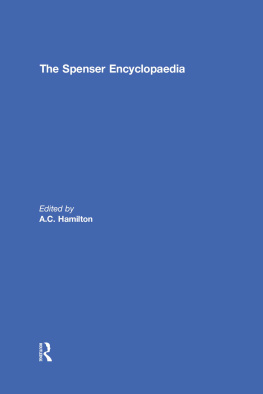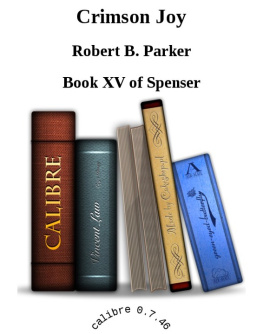Hecht Paul - Spenser in the Moment
Here you can read online Hecht Paul - Spenser in the Moment full text of the book (entire story) in english for free. Download pdf and epub, get meaning, cover and reviews about this ebook. City: Madison Teaneck, year: 2015, publisher: Fairleigh Dickinson University Press, genre: Detective and thriller. Description of the work, (preface) as well as reviews are available. Best literature library LitArk.com created for fans of good reading and offers a wide selection of genres:
Romance novel
Science fiction
Adventure
Detective
Science
History
Home and family
Prose
Art
Politics
Computer
Non-fiction
Religion
Business
Children
Humor
Choose a favorite category and find really read worthwhile books. Enjoy immersion in the world of imagination, feel the emotions of the characters or learn something new for yourself, make an fascinating discovery.
- Book:Spenser in the Moment
- Author:
- Publisher:Fairleigh Dickinson University Press
- Genre:
- Year:2015
- City:Madison Teaneck
- Rating:5 / 5
- Favourites:Add to favourites
- Your mark:
- 100
- 1
- 2
- 3
- 4
- 5
Spenser in the Moment: summary, description and annotation
We offer to read an annotation, description, summary or preface (depends on what the author of the book "Spenser in the Moment" wrote himself). If you haven't found the necessary information about the book — write in the comments, we will try to find it.
Spenser in the Moment — read online for free the complete book (whole text) full work
Below is the text of the book, divided by pages. System saving the place of the last page read, allows you to conveniently read the book "Spenser in the Moment" online for free, without having to search again every time where you left off. Put a bookmark, and you can go to the page where you finished reading at any time.
Font size:
Interval:
Bookmark:
Spenser in the Moment
Spenser in the Moment
Edited by Paul J. Hecht and J. B. Lethbridge

FAIRLEIGH DICKINSON UNIVERSITY PRESS
Madison Teaneck
Published by Fairleigh Dickinson University Press
Copublished by The Rowman & Littlefield Publishing Group, Inc.
4501 Forbes Boulevard, Suite 200, Lanham, Maryland 20706
www.rowman.com
Unit A, Whitacre Mews, 26-34 Stannary Street, London SE11 4AB
Copyright 2015 by Rowman & Littlefield Publishers, Inc.
All rights reserved . No part of this book may be reproduced in any form or by any electronic or mechanical means, including information storage and retrieval systems, without written permission from the publisher, except by a reviewer who may quote passages in a review.
British Library Cataloguing in Publication Information Available
Library of Congress Cataloging-in-Publication Data Available
ISBN: 978-1-61147-684-2 (cloth)
ISBN: 978-1-61147-685-9 (e-book)
 The paper used in this publication meets the minimum requirements of American National Standard for Information SciencesPermanence of Paper for Printed Library Materials, ANSI/NISO Z39.48-1992.
The paper used in this publication meets the minimum requirements of American National Standard for Information SciencesPermanence of Paper for Printed Library Materials, ANSI/NISO Z39.48-1992.
Printed in the United States of America
For Anne Lake Prescott

Preface
This collection describes and assesses some of what the editors propose are the most active areas of Spenser studies, and each chapter proposes a version of what has been done and what and how it should be done in the future. It is a state of the art collection with a twist, an opinionated state of the art or Forschungsbericht (report on research) with its own thesis. It had its generation in a conversation between J. B. Lethbridge and Fairleigh Dickinson University Press over an earlier collection published there, edited by Lethbridge, Edmund Spenser: New and Renewed Directions (2006). It was decided that now would be a good time to take stock of certain changes in criticism on Spenser, and to fill at least one lacuna in a pair of papers on Spenser and music. Further designs for musical exploration, in collaboration with living composers, as well as explorations of the potential for narratology (promisingly represented by two panel sessions at a recent Renaissance Society of America meeting), will have to await future venues. The planned focus on music and prosody led Lethbridge to enlist Paul J. Hecht as coeditor. The result was an exciting and fruitful collaboration that brought in scholars from around the world, a collation of recent change in the air, which seeks to offer some indication of the way forward, even as many of the papers indeed take a deliberately diagnostic and corrective approach. This volume attempts a contribution to the study of Spenser at a time when, with so much change behind us already in this young century, another series of changes gradually emerges from recent work, and a sense of expectation, as of held breath, seems to pervade the discipline.
The editors wish to thank Harry Keyishian of Fairleigh Dickinson University Press, Brooke Bures, Ashli MacKenzie, and Zachary Nycum of Rowman and Littlefield. In addition to our contributors, others that have made important contributions behind the scenes include Natalia Christoforou, Bradin Cormack, Kimberly Anne Coles, Jeff Dolven, Andrew Escobedo, Heather Fielding, Roger Kuin, Stefanie Lethbridge, Philipp Multhaupt, Anne Prescott, Melissa Sanchez, and Alexis Ulrich.

Abbreviations of Spensers Works
Bellay | Visions of Bellay |
Colin Clout | Colin Clouts Come Home Againe |
Epith | Epithalamion |
FQ | The Faerie Queene |
Gnat | Virgils Gnat |
Pet | Visions of Petrarch |
Proth | Prothalamion |
SC | The Shepheardes Calender |
Theatre | A Theatre for Worldlings |
Time | Ruines of Time |

Introduction
Notes toward a New Spenser
Paul J. Hecht
What set this volume in motion is a deep restlessness with aspects of the current consensus on Spenser, and a desire to press in new directions. At its heart, our restlessness is with how the experience of reading Spenser is typically described, or what reading experience is implied by dominant interpretations and arguments about his work. For Lethbridge as well as Gordon Teskey, whose contribution to this volume is most explicitly a theory of how to read Spenser, the abiding influence of the New Criticism looms large. In this view, a number of Spenser critics, but chief among them Paul Alpers, responded to the changing fashions of reading in the 1950s and 1960s by reinventing Spenser for close reading, by in effect installing a reading filter on The Faerie Queene that would allow the book and the author to hold ontodare I say it?market share in the endless competition for space at conferences, in journals, and in university presses. The succession of theoretical revolutions that followed the New Criticism generally shared, of course, its commitment to close reading. As did the New Historicism: even if its paradigmatic approach was that of innovative contextualization, the last move was often one of intensive close reading, hinging on a phrase, or a word. So despite the apparent variety of methodological approaches to Spenser in the last fifty years, our sense of the text itself, our approach to reading, and our account of the reading experience, has changed relatively little.
So how, then, might it be changed, and what sort of new Spenser might emerge as a consequence? The contributors to this collection do not offer exactly a rebuke to close reading, as in advocating for a big data, or surface-only approach to Spenser (although Lethbridges work in particular, coming off of the large-scale patterns revealed in his recent Concordance does this to an extent); but there is an insistence that methods of close reading that work for some early modern writers, for Donne, or Shakespeare, or Milton, emphatically do not work for Spenser. Teskey argues in his chapter here that reading Spenser as a poet of moments might offer a way forward, and he develops this through an extended analysis of the arrival of Florimell in book 3 of The Faerie Queene . He brings to bear, in particular, Augustine and Hegel in what he means by moment, including the Newtonian senses of the word that appealed to Hegel. In his reading, Florimell appears in what he calls kinestasis , both still and in motion, and that combination he argues is one of Spensers signal poetic effects, if not the defining effect. Teskeys chapter, the last in the volume, can serve to demonstrate the combination of conservation and progression that characterizes the revolution we have on offer here. That is to say, there is as much going back, taking up established and even reverend scholarly tasks and work, as there is searching for new methods, things done with Spenser yet undreamed of in anyones philosophy. Indeed, the first part of this book is composed entirely of old methodologies: a study of Spensers relationship with Virgil, of Spensers conception of the past, and of Spenser and book history. And yet each of these contributors demonstrates the revolutionary potential, the stored-up energy as it were, that can be released as they distinguish between what is old and settled opinion because it is right, and what is old and settled because it has been allowed to remain unexamined, unchallenged, where such examination yields new work, new understandings, new insight.
Next pageFont size:
Interval:
Bookmark:
Similar books «Spenser in the Moment»
Look at similar books to Spenser in the Moment. We have selected literature similar in name and meaning in the hope of providing readers with more options to find new, interesting, not yet read works.
Discussion, reviews of the book Spenser in the Moment and just readers' own opinions. Leave your comments, write what you think about the work, its meaning or the main characters. Specify what exactly you liked and what you didn't like, and why you think so.

